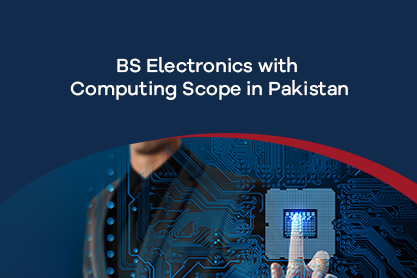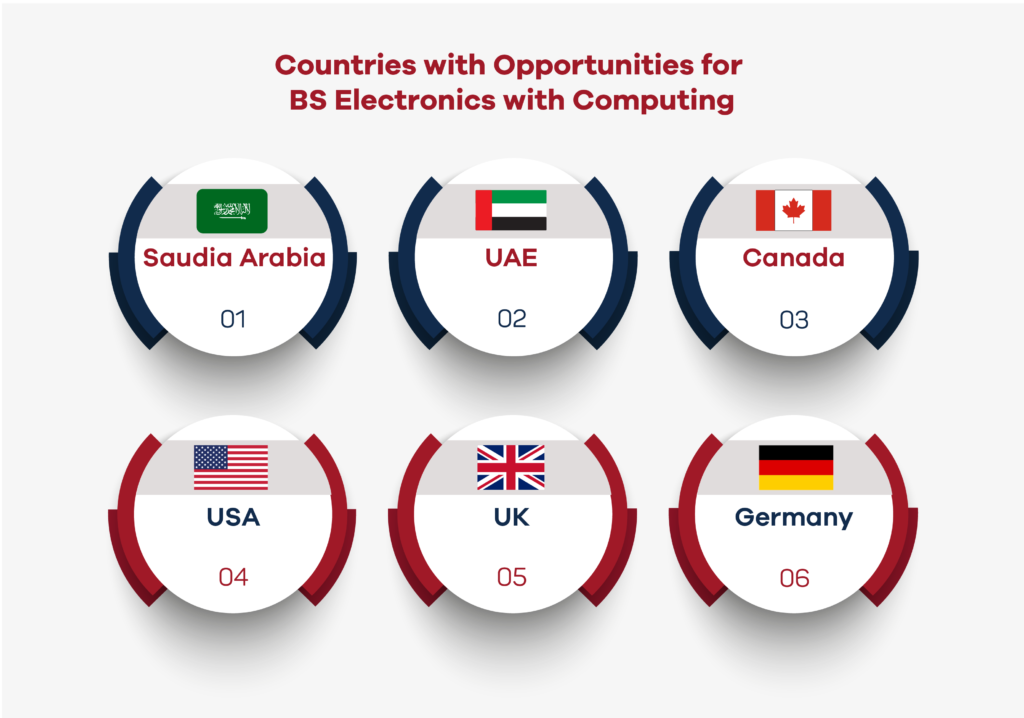BS Electronics with Computing Scope in Pakistan

BS Electronics with Computing is an undergraduate degree programme available at the University of Central Punjab (UCP). What this degree will offer you to learn, and what you can do once you earn it on the local and international level, is all a part of this Blog. Furthermore, you will also find the answers to your most frequently asked questions.
BS Electronics with Computing Programme Information
If you opt for a BS Electronics with Computing in your bachelor’s or undergraduate degree programme, you choose you pursue a multidisciplinary degree. This programme will help you learn the components of interrelated and comprehensive science fields. Consider the broadness of physics, electric engineering, computers, chemistry, and material science.
Furthermore, you will learn the modern, industry-relevant skills and gain the practical knowledge in this field at the UCP, with a degree in Electronics with Computing. You will learn more about the rationales of artificial intelligence, quantum computing, and renewable energy technologies.
Opportunities for career growth after BS Electronics with Computing
The graduates of BS Electronics with Computing will be ready to enter the industry once they complete the degree requirements. The opportunities they may get as a BS Electronics with Computing engineer are not limited to general roles. However, you will be ready to explore the roles across VLSI and embedded system designs, robotics, and artificial intelligence engineering roles in technical support, sales engineering.
The roles you may get at the entry level can be anything like the following, but not limited to.
- VLSI Design Engineer
- Embedded System Engineer
- Robotics Engineer
- Network Engineer
- R& D Software Engineer
- Technical Support Engineer
- Instrumentation Engineer
- Service Engineer
- Quality Engineer
Imagine working after BS Electronics with Computing in the best solar company in Pakistan. In addition, a combined degree in electronics and computing will also work as the gateway to opportunities in foreign countries. The countries with a major chunk of career growth in the relevant and related fields are listed below.
- Saudia Arabia
- UAE
- Canada
- USA
- UK
- Germany
Potential to Earn after a BS Electronics with Computing Degree
A BS Electronics with Computing Degree will help you earn a handsome amount in both Pakistan and abroad. In Pakistan, the average electronic engineer can earn up to PKR 94117/-. However, the salary fluctuates on different bases.
On the other hand, the professional outlook for electrical and electronics engineers in the US is positive for the decade of (2024-34), around 7%. Furthermore, the job description for these professionals revolves around office settings.
Skills You Will Learn with BS Electronics with Computing at UCP
The four-year degree in electronics with computing will help you learn the hard and soft skills side by side. The degree will teach some real-life skills and real-world guidance when you study under the mentorship of professional and experienced teachers.
The hard skills you will learn in this degree programme are not limited to but include the following.
- Embedded Systems and Internet of Things (IoT)
- Circuit Design and Microcomputers
- Programming for Electronic Systems
- Artificial Intelligence and Machine Learning
- Signal Processing and Control Systems
- Networking and Communication Technologies
- Robotics and Automation
- Quantum Computing
In addition to these hard skills, you will also need a set of well-developed soft skills to achieve success in your professional life. Some of the most demanded soft skills for the field of electronics with computing are listed below.
- Problem Solving
- Critical Thinking
- Communication
- Adaptability
- Flexability
- Collaboration
- Teamwork
- Time Management
- Organisation
- Leadership
- Ability to see through the lines and details
Why choose UCP for BS Electronics with Computing?
One of the most critical and impactful decisions for any student is to choose the right educational institution. The right institution is a subjective choice. The one offering academic excellence, industry relevance and a chance to make a successful career with a strong industrial presence is the right institution for you.
The University of Central Punjab (UCP) is a well-known private university in Lahore. The university has earned recognition and a reputation across diverse industries. Our degree programmes are not only highly industry relevant but also in complete accordance with the regulatory requirements of the governing bodies like the Higher Education Commission (HEC).
Furthermore, with all this, we have developed a centrally located campus with state-of-the-art facilities and opportunities to learn through socialising and collective efforts. UCP has student-led societies and communities.
In addition, the scholarship options and financial assistance are readily available for students across the undergraduate, graduate, and postgraduate programmes. The criteria and metric requirements are prerequisites to meet in order to be eligible for the scholarship programmes.
Specifically, when it comes to the faculty and degree programmes and how good they are. The BS Electronics with Computing is offered under the faculty of science and technology (FOST). This faculty is one of the most productive, research-oriented, and results-generating among the UCP faculties.
Throughout the year, the students across the faculty of science and technology participate in a wide set of events on different scales. They learn skills, gain knowledge and win prizes.
Apply for Fall 2025 Admissions in Electronics and Computing
If you are willing to continue your advanced education in BS Electronics with Computing, you can apply to UCP for Fall 2025. The admissions are on and apply at your earliest convenience to avoid missing the chance. You can proceed through the online admission portal available on our website.
Final Words
BS Electronics with Computing is your gateway to a successful career. UCP offers Fall 2025 admissions through the online portal. You can learn, gain knowledge, and earn a market-preferred and accredited degree from UCP.
FAQs
1. What is the actual scope and job market in Pakistan for BS Electronics with Computing?
Answer: The scope is excellent because the skill set is in high demand.
Graduates can look for jobs in:
- Embedded Systems & IoT:
- Telecommunications: (PTCL, Mobilink, Telenor, etc.)
- Power Electronics & Automation: Industrial automation and power sectors.
- Consumer Electronics & Appliances: Companies like LG, Samsung, Dawlance.
- IT and Software Development: Your computing background allows you to compete for software jobs.
- R&D and Defence Sector: (e.g., NESCOM, PAEC, AVIC), which highly value such technical blends.
2. Can I get a software job / become a software engineer with this degree?
Answer: Yes, absolutely. This is one of the biggest advantages. The degree includes programming fundamentals, data structures, OOP, and often databases. You will be eligible for software roles, but you must self-learn and build projects in popular web/mobile/desktop technologies beyond the university syllabus to compete with CS graduates.
3. How does this degree compare to a pure BS Computer Science or BS Electrical Engineering?
Answer:
- BSCS: You have a stronger understanding of the hardware that software runs on. You are better suited for embedded software, drivers, robotics, and IoT than a pure CS grad, but you may have less depth in advanced algorithms and software engineering theory.
- BSEE: You have much stronger programming and computing skills. You are better suited for smart systems, digital signal processing, and automated control systems than a pure EE grad, but you may have less depth in high-power systems and heavy machinery.
4. Is this degree very difficult? What is the balance between hardware and software?
Answer: It is considered one of the more challenging engineering degrees because you have to master two demanding fields. The curriculum is typically a 60/40 or 50/50 split between electronics (circuit analysis, digital logic, microcontrollers) and computing (programming, OS, networks). A strong foundation in FSc Physics, Maths, and Computer Science is crucial. Check the eligibility criteria here.
5. What kind of final year projects can we do?
Answer: This is where the degree shines. Project ideas include:
- Robotics & Drones: Autonomous navigation systems.
- Smart Home Systems: IoT-based security or energy management.
- Biomedical Devices: Heart rate monitor, pulse oximeter.
- Computer Vision: Using a Raspberry Pi/Arduino for object detection.
- Telecom Projects: Software Defined Radio (SDR) applications.
6. What are the opportunities for higher studies (MS/PhD) abroad?
Answer: The degree provides an excellent foundation for MS/PhD in highly sought-after fields like:
- Embedded Systems
- Robotics
- VLSI Design (Chip Design)
- Telecommunications
- Computer Engineering
- Even Data Science/AI (with the right elective courses and preparation). Your unique profile can make you stand out in applications.
7. Is the “Computing” part strong enough, or is it just basic programming?
Answer: It is substantially more than just basic programming. A good program will cover core CS subjects like Data Structures & Algorithms, Object-Oriented Programming, Database Systems, Operating Systems, and Computer Networks. However, it may not go as deep into theory (e.g., Compiler Design, Advanced OS) as a pure CS degree. The focus is often on computing as it interacts with hardware. Check the curriculum here.
